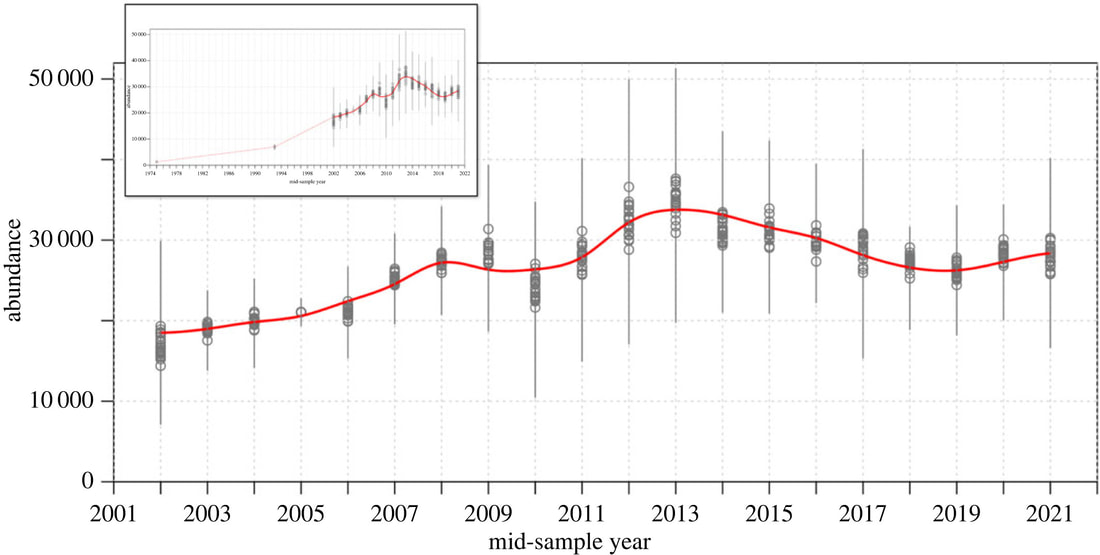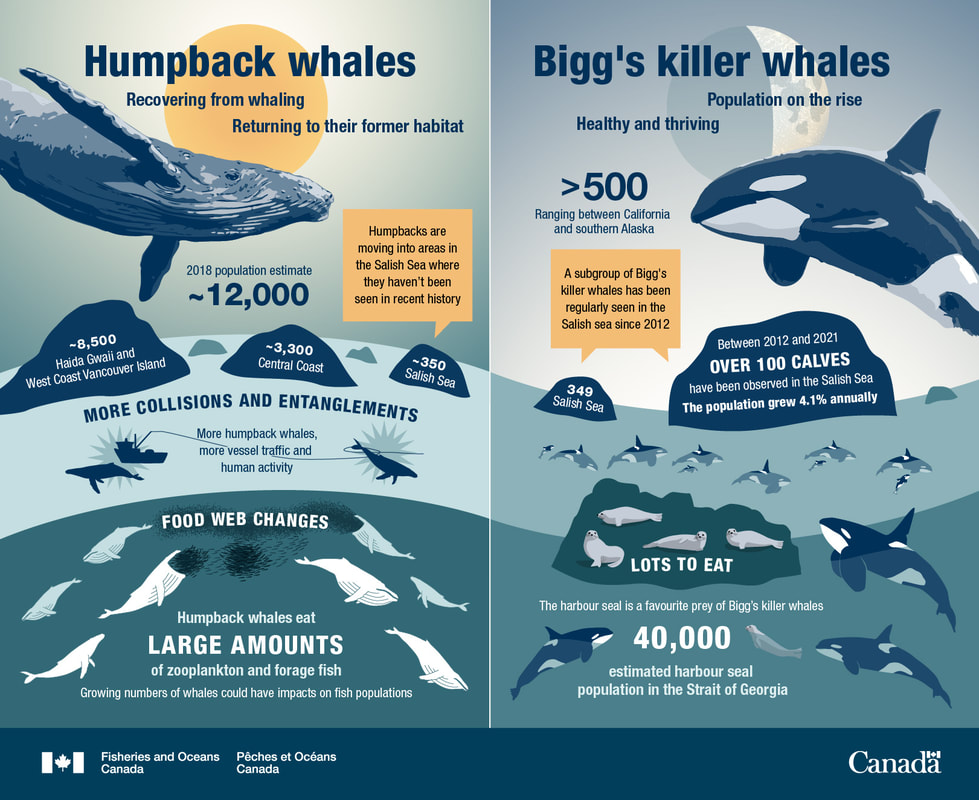|
A Global News story called Marine heat wave linked to 20% drop in North Pacific humpbacks: Study, asserts that a 2014 anomalous warming event in the North Pacific called The Blob, is linked to a decline in Humpback whale numbers. This arises from a study published by the Royal Society titled: Bellwethers of change: population modelling of North Pacific humpback whales from 2002 through 2021 reveals shift from recovery to climate response. The local experts contacted by Global News agree that The Blob was, of course, caused by anthropogenic climate change. It’s just yet another indicator of our impacts as humans … says Karina Dracott of Oceanwise. Jackie Hildring, for the Canadian Pacific Humpback Collaboration (CPHC), adds So just in case anyone is looking for additional motivation to soften the impacts of climate change, here’s another one. Humpback numbers did drop-off from 2014 but have recovered somewhat since 2019. It is important to note that the long term trend is positive according to this Royal Society study graph and inset: The graph doesn’t include 2022 which, according to a December 14, 2022 CPHC report titled Highest number of Humpback Whales recorded to date in the Salish Sea, set an all-time abundance record for local waters. That article also clarifies: There appears to be a misconception that Humpbacks are just passing through the Salish Sea. Rather, many of the whales return to the same, specific areas to feed year-after-year and stay for months at a time. Yet now according to the Global News report, the same CPHC spokesperson takes a somewhat different position: In B.C., much attention has been directed to the so-called “humpback comeback,” with increased sightings of the whales. Hildering said the research shows how that increased presence may be a factor of whales moving from elsewhere, rather than a sign of a healthier population. “It can be really tempting to think everything is fine, we’re seeing more humpbacks along the coast, but where are those shifting from?” she said. But from another study called Summer Feeding Areas, Winter Feeding Areas and Migration, Cascadia Research Collective in Washington state sets out: Humpbacks tended to return to the same wintering and feeding grounds each year. This indicates that humpbacks have a strong affinity towards specific areas. From this, and CPHC’s own admission in 2022, the record number of whales recently documented in the Salish Sea likely did not move in from elsewhere (because of Climate Change). Confusing the public even further, CPHC tells Global News that: The Committee on the Status of Endangered Wildlife in Canada (COSEWIC) listed the whales as a species of “special concern” in its 2022 assessment, in part because of concerns about marine heat waves, she said. This suggests that Humpbacks were doing fine but now, due to Climate Change, they have been placed on the Species at Risk list. The actual history is that Humpbacks were hunted to the brink of extinction until legal protection in 1966. The world-wide population has been gradually recovering (see the earlier inset graph). For Canadian waters, the COSEWIC Species at Risk - Humpbacks Assessment sets out: The North Pacific population was designated Threatened in 1985. Status re-examined and confirmed in May 2003. Status re-examined and designated Special Concern in May 2011. Status re-examined and confirmed in December 2022. (emphasis added) So, the numbers of Humpback whales improved from Threatened to Special Concern by 2011, and that status was confirmed in 2022 despite The Blob and Global Warming. Further, bucking the litany of warmest-year-ever doom and gloom, 2022 saw the strongest cetacean abundance in the Salish Sea ever recorded. Fisheries and Oceans Canada explain The Blob: The marine heatwave that occurred in the northeast Pacific Ocean during 2014-16, widely known as “the Blob,” was an extreme heat event. Peak surface temperatures up to 3°C warmer than normal persisted for almost two years. The Blob was greater than any previous records in magnitude, geographic scope and duration. It affected the ecosystem from microorganisms to top predators. The Blob was caused by an atmospheric stall, an unusual and persistent combination of factors: warmer air temperatures (which warm the ocean’s surface); changes in the patterns of wind speed, direction, and duration (reducing the mixing of ocean layers and the upwelling effect); and a persistent El Niño mass of warmer equatorial water. In contrast to there being residual negative Blob effects, their website displays the optimistic graphic: Along with recovering Humpbacks and thriving Killer Whales, spawning Herring numbers have just significantly improved which will surely benefit our Salmon populations. Yet we continue to endure the pessimistic blather from those preaching atop their Climate Change soapboxes, poisoned by the likes of UN’s Antonio Guterres spouting his nonsense: The era of global warming has ended; the era of global boiling has arrived. If the world’s climate is so much worse than it was in 2014, why hasn’t The Blob reappeared? If today’s warmer ocean temperatures are so bad, why are local marine stocks in recovery? If Humpback numbers are trending upward, why are the save-the-whale-orgs trying to deflect that message? Apparently, good news can not be allowed to infiltrate the bleak anti-world of climate alarm.
0 Comments
Leave a Reply. |
Hot Topics
Aboriginal Title Almost Record Heat Atmospheric Rivers Attribution Simulation Carbon Capture Child Litigation Climate Shift Index CO2 Offset Leakage Coastal Flood Risk Democracy Lost Drought Exaggeration Eco-Negativity Eco-Politics ESC Investment Evolution Excess Hydro Expert Hypocrisy Extreme Heatwaves Fake Hype Geo-Engineering Government Bias Heat Waves Hottest Month Ever Hottest Year Ever Housing Crisis Hyperthermia Ice Roads Indigenous Conservation Indoctrination Kelp Farms Landslides Media Bias Mental Illness Misplaced Reconcilliation Misleading Data National Discord Natural Gas Net-Zero Future Outside Play Park Take-Over Political Deception Public Safety Impasse Sea Level Ruse Socialist Agenda Solar Panels Species Not At Risk Statistical Dishonesty Sue Big Oil Temperature Trickery Treaty Infringment Tsunami Refuge Unmarked Burials Unprecedented Drought Urban Heat Island Very Hot Days Warming Causes Cold Water Supply White Dislike Wildfire Wildlife Death Woke Plans Worsening Storms |


